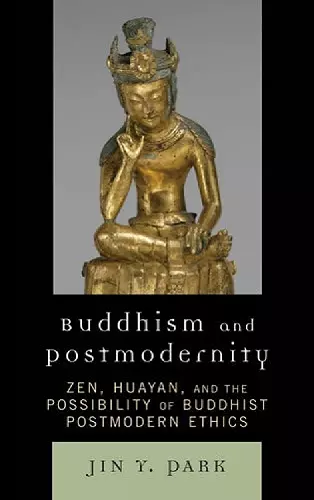Buddhism and Postmodernity
Zen, Huayan, and the Possibility of Buddhist Postmodern Ethics
Format:Paperback
Publisher:Bloomsbury Publishing PLC
Published:28th Oct '10
Currently unavailable, and unfortunately no date known when it will be back

Buddhism and Postmodernity is a response to some of the questions that have emerged in the process of Buddhism's encounters with modernity and the West. Jin Y. Park broadly outlines these questions as follows: first, why are the interpretations and evaluations of Buddhism so different in Europe (in the nineteenth century), in the United States (in the twentieth century), and in traditional Asia; second, why does Zen Buddhism, which offers a radically egalitarian vision, maintain a strongly authoritarian leadership; and third, what ethical paradigm can be drawn from the Buddhist-postmodern form of philosophy?
Park argues that, as unrelated as these questions may seem, the issues that have generated them are related to perennial philosophical themes of identity, institutional power, and ethics, respectively. Each of these themes constitutes one section of Buddhism and Postmodernity. Park discusses the three issues in the book through the exploration of the Buddhist concepts of self and others, language and thinking, and universality and particularities. Most of this discussion is drawn from the East Asian Buddhist traditions of Zen and Huayan Buddhism in connection with the Continental philosophies of postmodernism, hermeneutics, and deconstruction. Self-critical from both the Buddhist and Western philosophical perspectives, Buddhism and Postmodernity points the reader toward a new understanding of Buddhist philosophy and offers a Buddhist-postmodern ethical paradigm that challenges normative ethics of metaphysical traditions.
Jin Y. Park’s work is a major achievement of phenomenological hermeneutics. It is indeed of exceptional quality which is capacious and deep in scope, lucid and erudite in style, and poignant and engaging in argumentation. Park is at ease with surfing the ineffable and seemingly contradictory expressions of Zen Buddhism and with scaling the rugged terrains of postmodern thought. Park’s most creative, incisive, and discerning moments are found in her very attempt to transversalize the borders of Eastern Buddhism and Western philosophy both modern and postmodern. To put it simply, it is intercultural and interdisciplinary. I find that her appropriation of postmodern philosophy in Merleau-Ponty, Heidegger, Derrida, and Lyotard is judicious and discriminating. Among the notable features of Park’s work is a singularly prominent place of Korean Buddhism, the 'Zen hermeneutics' of language, silence and violence, and most importantly her ambitious and promising vision of creating a new paradigm of ethics at the crossroads of Buddhism and postmodern philosophy. -- Hwa Yol Jung, Moravian College
Buddhism and Postmodernity is a fascinating journey into the field of Buddhist philosophy. Jin Park skillfully negotiates a variety of discourses including Buddhist studies, feminism, and postmodernism. She masterfully unmasks prejudices about Buddhist traditions and their alleged lack of propensity for systematic thought, and presents a convincing case for a Zen ethics by demonstrating affinities between Zen and deconstruction. Her mastery of the material is impressive, her sketch of Zen philosophy visionary. For everyone with interest in Buddhism and/or postmodernism, Buddhism and Postmodernity is a must-read. -- Gereon Kopf, Luther College
...Admirably concise and yet complex... Professor Park carefully exemplifies her own conclusions regarding the centrifugal potentials of Buddhist thought and practice by offering us clearly presented prospects on a yet-to-come ethics of non-dual interdependence. The wide ambitions of Buddhism and Postmodernity are skillfully threaded together through recurring contrasts of centripetal/centrifugal and hermeneutical/existential dynamics at play both historically and philosophically, in the West and its encounters with Buddhism, and in the global transit from modernity to postmodernity . . . Buddhism and Postmodernity raises important questions, opening promising avenues for further conversation. * Sophia: International Journal of Philosophy and Traditions *
The dialogue between Buddhism and postmodernity is one of the most exciting developments in contemporary philosophy, with important implications for ethics. Jin Y. Park's insightful study of their relationship is grounded in a deep understanding and appreciation of both traditions. Her book is a welcome addition to the growing literature. -- David R. Loy, Xavier University
ISBN: 9780739118245
Dimensions: 231mm x 155mm x 24mm
Weight: 460g
296 pages